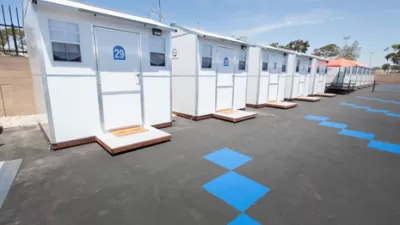Tiny homes have an appeal that might be hard to admit—either for living vicariously or for less respectful reasons, people want to watch other people live small.
The first tiny home village in Denver had become a kind tourist attraction or curiosity, according to an article by Tom McGhee, until a new privacy fence was installed around the area.
"60 volunteers wove colored slats through the 400 feet of chain-link fence that surrounds the Beloved Community Village at the corner of 38th and Walnut streets," reports McGhee, ending the "fishbowl" experience of the formerly homeless residents living there.
According to residents of the village, there were occasionally as many as ten people a day stopping to take pictures. "Residents reached out to the RiNo Art District and requested a creative solution to the lack of privacy for villagers, and the district responded with a plan to obscure the view with a riot of color," according to McGhee.
The article includes more details about the construction of the fence, the volunteer support that made the project possible, and more about the village's position in the surrounding community.
FULL STORY: Formerly homeless tiny village residents in Denver get a colorful privacy fence

Planetizen Federal Action Tracker
A weekly monitor of how Trump’s orders and actions are impacting planners and planning in America.

Maui's Vacation Rental Debate Turns Ugly
Verbal attacks, misinformation campaigns and fistfights plague a high-stakes debate to convert thousands of vacation rentals into long-term housing.

Restaurant Patios Were a Pandemic Win — Why Were They so Hard to Keep?
Social distancing requirements and changes in travel patterns prompted cities to pilot new uses for street and sidewalk space. Then it got complicated.

In California Battle of Housing vs. Environment, Housing Just Won
A new state law significantly limits the power of CEQA, an environmental review law that served as a powerful tool for blocking new development.

Boulder Eliminates Parking Minimums Citywide
Officials estimate the cost of building a single underground parking space at up to $100,000.

Orange County, Florida Adopts Largest US “Sprawl Repair” Code
The ‘Orange Code’ seeks to rectify decades of sprawl-inducing, car-oriented development.
Urban Design for Planners 1: Software Tools
This six-course series explores essential urban design concepts using open source software and equips planners with the tools they need to participate fully in the urban design process.
Planning for Universal Design
Learn the tools for implementing Universal Design in planning regulations.
Heyer Gruel & Associates PA
JM Goldson LLC
Custer County Colorado
City of Camden Redevelopment Agency
City of Astoria
Transportation Research & Education Center (TREC) at Portland State University
Jefferson Parish Government
Camden Redevelopment Agency
City of Claremont





























